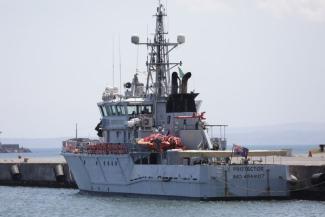Frontex
Securing EU borders

In recent years, a major focus of its work has been conducting sea patrols in the Mediterranean. The tasks performed by Frontex have changed since the agency was created in 2005. In particular, its powers and capabilities have been extended.
Old model: analysis, coordination, support
Originally, the agency’s activities were almost entirely confined to analysis, coordination and support. With regard to illegal migration and cross-border crime, Frontex’s mandate was to gather information, evaluate data, assess risks and help prevent anticipated offences.
Frontex was not a police force in an institutional sense as it was not part of the executive arm of government. The agency’s role was confined to coordinating the activities of member states’ border guards. The creation of rapidly deployable border force units (Rapid Border Intervention Teams – RABITs) enabled operations to be carried out swiftly. From that point onwards, Frontex was not only active at sea but also involved in surveillance work at airports and along internal borders. It was additionally given the task of supporting EU member states’ return operations for irregular immigrants.
New model: European border and coast guard
At the end of 2015, the EU member states agreed to strengthen the agency both financially and in terms of staff. That agreement was followed by the new “Frontex Regulation”, which formally established the updated agency. A rapid reaction pool was created, enabling Frontex to deploy as many as 1,500 border guards. The new “European Border and Coast Guard Agency” includes the “old” Frontex plus the national authorities responsible for border management, including coast guards to the extent that they carry out border control tasks. The new Frontex remains the same legal person as the old one, with full continuity in all its activities and procedures.
The agency’s main tasks continue to be:
- the development of technical and operational strategies for implementing integrated border management,
- intervention in situations where urgent action is required at external borders,
- technical and operational assistance with search and rescue operations at sea and
- organising return operations.
In emergency situations, it can require member states to cooperate. In exceptional cases, it can take action without a member state’s request. The tasks also include carrying out vulnerability assessments for external borders and optimising risk analysis. In this context, it is independent in terms of technical and operational matters. It enjoys legal, administrative and financial autonomy. However, the European Commission and the EU member states exercise supervision on the agency through representatives on a management board that administers Frontex’s affairs. (ohg)










